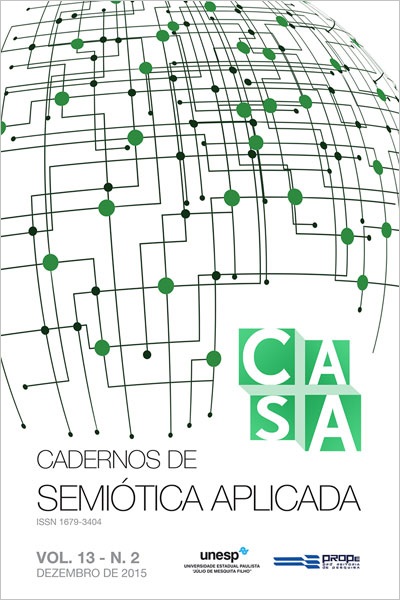O ENUNCIATÁRIO EM POESIAS DIGITAIS
DOI:
https://doi.org/10.21709/casa.v13i2.8017Palavras-chave:
Enunciatário, Poesia digital, Interação enunciativa, Participação, LeituraResumo
As mudanças produzidas pelas novas práticas de relações intersubjetivas na internet, envolvendo os textos poéticos publicados na web, merecem a atenção dos estudiosos do discurso. Neste artigo, analisaremos o estatuto de participação do enunciatário de poesias digitais de língua portuguesa, a partir do quadro teórico da semiótica de linha francesa, observando seus modos de presença e práticas de leitura, apreensíveis pelos próprios enunciados. Levaremos principalmente em conta poemas que utilizam os recursos sincréticos, com animação, que o meio digital disponibiliza, publicados em diversos sites de poesia e sites oficiais de poetas disponíveis na web (sites como Errática, Zunái, Cronópios etc., e os de autores como o de Arnaldo Antunes, o de Augusto de Campos, entre outros), verificando como constituem o ciberleitor. Identificamos, na variedade de modos de leitura e de participação do enunciatário, uma tipologia que organiza em traços gerais as formas de constituição desses leitores, relativamente à competencialização cognitiva e pragmática pressuposta à leitura e à maneira como fazem face à convocação pelo enunciador à participação e à experimentação lúdica e estética dos recursos expressivos. Enfim, é preciso compreender também de que modo essas práticas de leitura se aproximam ou se distanciam das que já se fazem presentes nos textos impressos.
Downloads
Publicado
Edição
Seção
Licença
Os autores dos trabalhos aprovados concordam em ceder aos CASA os direitos não exclusivos de publicação, permanecendo livres para disponibilizar seus textos em outros meios desde que mencionada a publicação da primeira versão na revista. Autorizam, ainda, a revista a ceder seu conteúdo para reprodução em indexadores, repositórios e similares. É vedada a tradução para outro idioma sem a autorização escrita do Editor, ouvida a Comissão Editorial. A responsabilidade do conteúdo dos artigos é exclusiva dos autores.

